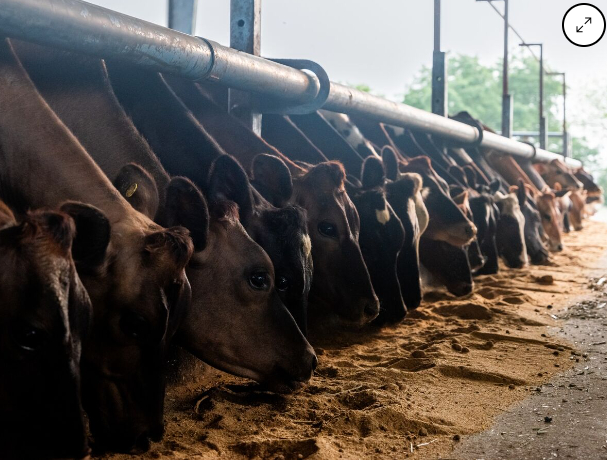May 20, 2025 | 13:53 GMT +7
May 20, 2025 | 13:53 GMT +7
Hotline: 0913.378.918
May 20, 2025 | 13:53 GMT +7
Hotline: 0913.378.918

The food industry’s climate footprint is immense, accounting for about a third of global greenhouse gases. Livestock, which releases potent methane, makes up 14.5% of worldwide emissions.
Photographer: Anindito Mukherjee/Bloomberg
Disclosed emissions from the world’s 20 largest publicly-listed meat and dairy companies rose 3.3% from 2022 levels, according to a report by investor network FAIRR Initiative. Its analysis includes companies like Hormel Foods Corp. and China’s New Hope Liuhe Co., which supply household names like Walmart Inc. and McDonald’s Corp.
The food industry’s climate footprint is immense, accounting for about a third of global greenhouse gases. Livestock, which releases potent methane, makes up 14.5% of worldwide emissions. The Science-Based Targets initiative, a UN-backed agency that evaluates companies’ net-zero goals, recommends that the food and agriculture sector cuts emissions by 3% a year between 2020 and 2030.
“The sector is just not on track,” said Thalia Vounaki, senior manager for research and engagements at FAIRR.
That underlines the need to focus on food and agriculture as world leaders gear up for the upcoming COP28 summit in Dubai later this month, FAIRR said in its report. The group of investors raises awareness about the environmental, social and governance risks and opportunities in the global food sector, and is backed by more than $70 trillion in assets.
The United Arab Emirates has called for commitments to transform the food industry, while the United Nations’ Food and Agriculture Organization is set to unveil a net-zero roadmap for the sector.
FAIRR’s report highlights that some companies have managed to reduce their emissions, such as Tyson Foods Inc. and Danone SA. But overall there are varying levels of climate commitments and disclosure, it said. Almost two-thirds of the companies it analyzed didn’t disclose so-called Scope 3 emissions, which include those that occur indirectly along a company’s value chain. Only four out of top 20 companies in the sector have net-zero aims.
“We need to get these companies up to the same standard, irrespective of where they’re sitting,” Oshni Arachchi, head of active ownership at Danske Bank A/S, said in an interview.
FAIRR’s sixth protein producer index has highlighted improvements made by the livestock industry, including in areas like alternative proteins, waste and pollution and water use, it said. While that shows “bad practice is not an inevitable part of the food supply ecosystem,” the investor group urged for more progress on environmental aspects.
“We’ve long known that humanity can’t fix climate change without fixing the way we feed the world,” according to Jeremy Coller, private equity investor and founder of FAIRR.
(Bloomberg)

(VAN) Attempts to bring down the price of the Japanese staple have had little effect amid a cost-of-living crisis.

(VAN) Fourth most important food crop in peril as Latin America and Caribbean suffer from slow-onset climate disaster.

(VAN) Shifting market dynamics and the noise around new legislation has propelled Trouw Nutrition’s research around early life nutrition in poultry. Today, it continues to be a key area of research.

(VAN) India is concerned about its food security and the livelihoods of its farmers if more US food imports are allowed.

(VAN) FAO's Director-General emphasises the need to work together to transform agrifood systems.

(VAN) Europe is facing its worst outbreak of foot-and-mouth since the start of the century.

(VAN) The central authorities, in early April, released a 10-year plan for rural vitalization.